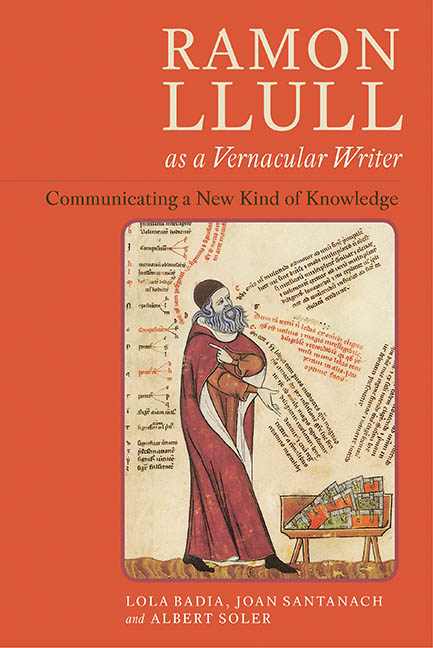Book contents
- Frontmatter
- Dedication
- Contents
- Illustrations
- Acknowledgements
- Abbreviations
- Introduction
- 1 Ramon Llull's Art, Language, and Literary Expression
- 2 Style and Genre in the Writings of Ramon Llull
- 3 The Composition and Dissemination of Ramon Llull's Texts, from Script to Print
- 4 Ramon Llull's Vernacular Context
- Epilogue. Ramon Llull's OEuvre as a Whole: Autobiographism and Self-Referentiality
- Appendix 1 First-Generation Llullian Manuscripts
- Appendix 2 Catalan Language and Literature in Relation to Ramon Llull
- Bibliography
- Index
Introduction
Published online by Cambridge University Press: 05 June 2016
- Frontmatter
- Dedication
- Contents
- Illustrations
- Acknowledgements
- Abbreviations
- Introduction
- 1 Ramon Llull's Art, Language, and Literary Expression
- 2 Style and Genre in the Writings of Ramon Llull
- 3 The Composition and Dissemination of Ramon Llull's Texts, from Script to Print
- 4 Ramon Llull's Vernacular Context
- Epilogue. Ramon Llull's OEuvre as a Whole: Autobiographism and Self-Referentiality
- Appendix 1 First-Generation Llullian Manuscripts
- Appendix 2 Catalan Language and Literature in Relation to Ramon Llull
- Bibliography
- Index
Summary
Ramon Llull (1232–1316) is the author of a voluminous body of philosophical and theological works, though his is a figure which cannot be likened to that of a scholar operating during the latter part of the thirteenth and the beginning of the fourteenth century. One of the characteristics which best defines his individuality is the relation he established with vernacular languages in the process of composing and disseminating his works. At a time when learned texts and university culture were conveyed for the most part using the vehicle of Latin, Ramon Llull wrote a substantial proportion of his works in his maternal Catalan, while being deeply involved in the circulation of such works in other Romance languages too. Even though no manuscript has been preserved, Llull wrote a number of works in Arabic, the language used by a large section of the non-believers he wished to convert to Christianity. That said, a significant number of the titles comprising his extensive output of more than 260 items were written directly in Latin, and he had various books which were originally conceived in Catalan subsequently translated into Latin. In Llull's case, therefore, Latin and Catalan do not constitute separate categories, but rather two sides of the same coin.
Even if international familiarity with Ramon Llull stems primarily from his writings in Latin, vernacularism plays a fundamental role in his oeuvre: this particular characteristic does not impinge solely upon his writings in the vulgar tongue, but rather likewise conditions the books he wrote in the language of learning. Moreover, although he visited the universities of Montpellier and Paris, Ramon Llull did not follow any organized course of studies. His intellectual apprenticeship was conducted above all as an autodidact and came about once he had already taken on ample baggage from Romance languages and literature as a result of his having been a member of the court of Prince James of Majorca. Llull was an atypical ‘scholar’ because he enjoyed a form of access to knowledge that differed from the norm and because he set about organizing the production and dissemination of his writings in an unconventional fashion. Llull's ways of conceiving, composing and disseminating his works became gradually adapted to contexts which varied according to the changes undergone by his intellectual and missionary project as well as to the surrounding circumstances.
- Type
- Chapter
- Information
- Ramon Llull as a Vernacular WriterCommunicating a New Kind of Knowledge, pp. 1 - 36Publisher: Boydell & BrewerPrint publication year: 2016



